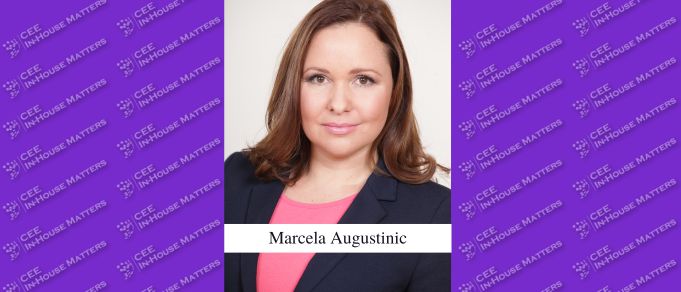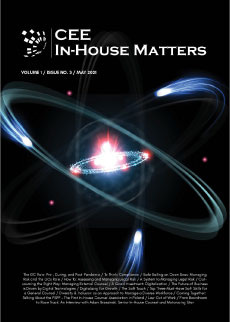With a background in international law firms, Marcela Augustinic transitioned to become the first general counsel at DM Drogerie Markt in Slovakia, where she has been serving for the last eight years. Augustinic shares her strategies for balancing internal and external legal resources to tackle emerging regulatory challenges and drive sustainable growth in the ever-evolving market.
CEELM: Tell us a bit about yourself and your career path leading up to your current role.
Augustinic: I have had the privilege of working in international law firms in Prague and Bratislava as a Senior Attorney for many years. My career took an exciting turn when I was offered the opportunity to join DM Drogerie Markt in Slovakia as their first General Counsel and to develop its internal legal team. This was a tremendous opportunity and, at the same time, a challenge to bring my vision into such a well-established multinational company operating in CEE.
I have now been active as the company’s General Counsel for eight years. I can confidently say that this experience has greatly enriched me professionally and continues to provide me with ongoing growth and fulfillment. I enjoy the challenges and opportunities that come with the role of an in-house lawyer.
CEELM: What was the biggest shock when transitioning to the in-house world? On the flip side, what was the most pleasant surprise?
Augustinic: Transitioning from a law firm with many clients to the in-house counsel role within a multinational company was indeed a remarkable experience. One of the advantages of being an in-house counsel is having the opportunity to be involved in projects at both national and international levels in a variety of areas, as well as in being involved in internal processes from their launch to their implementation. Being an in-house counsel allows you to look into the internal workings of the company that you usually do not have access to in private practice. This position requires a deep understanding of the internal processes of the company, thinking in broader contexts, identifying interplays between different departments and topics, as well as finding customized solutions to address the specific needs and goals of the company. This requires many years of practice and a broad range of expertise in a number of legal areas. Having a business approach and economic background is beneficial as well. The company is constantly evolving and with this comes greater dynamism in setting up processes and finding legal solutions. As an in-house counsel, there are no external clients. Instead, we work closely with internal clients, providing support to various departments, branches, the central warehouse, and management. This requires the ability to quickly respond to legal requests from different areas and sides, using their own business language.
One notable difference from private practice is the immediate feedback from internal clients throughout the process of addressing their legal issues. From the initial stages to the final decision and implementation, there is direct communication and involvement with the internal client. This feedback loop enables a more effective and efficient approach to problem-solving within the company.
CEELM: How large is your in-house team currently, and how is it structured?
Augustinic: Our in-house team currently consists of three lawyers, with each member specializing in different legal areas and topics. This strategic allocation of expertise allows us to efficiently handle a wide range of legal matters. Furthermore, within our corporate group, we maintain close interaction with legal teams from other countries. We frequently collaborate and exchange experience and expertise on shared projects and topics. This collaborative approach extends to the establishment of internal processes throughout the entire group, ensuring synchronization and consistency across multiple jurisdictions. It allows us to effectively leverage knowledge and resources, ultimately providing comprehensive and tailored legal support to the company’s operations.
CEELM: What has been keeping you and your in-house team busy over the last 12 months?
Augustinic: Our company has embraced dynamic changes over the past 12 months related to the improving environmental footprint of its operations and adjusting to the new legislation. We dedicated significant efforts toward environmental, social, and governance compliance and new EU regulations. Our company also targeted reducing its environmental footprint, investing in technologies, and implementing sustainable concepts and projects in the field of environmental preservation, including for the branded product lines. At a Europe-wide level, our company has adopted an ambitious strategy to fully phase out natural gas supply by 2030 and prioritize the use of cutting-edge VRV systems for heating and cooling. To fulfill this strategy, we have successfully transitioned 16 branches and have been conducting negotiations with landlords to install photovoltaic panels and decarbonization of our branches. Additionally, we are looking to expand our branch offers to include over-the-counter medications. However, the heavy regulation in this area in Slovakia presents a significant challenge.
CEELM: What about the upcoming 12 months? What are you keeping on your radar that you think will impact your workload the most?
Augustinic: Looking ahead to the upcoming 12 months, there are several initiatives on our radar that we believe will significantly impact our workload. The company plans to open new branches to reach a wider customer base and further expand its market presence. Additionally, the company is in the process of launching a pilot program for self-checkout systems in select branches, aiming to enhance the overall customer experience and streamline our operations. Furthermore, there is a need to modernize the IT infrastructure across branches as part of an ongoing commitment to stay at the forefront of technological advancements. Overall, the focus remains on continued growth, sustainability, and delivering exceptional customer service. The company will prioritize staying abreast of emerging trends, such as advancements in renewable energy, eco-friendly initiatives, and regulatory changes, as they will undoubtedly impact the nature and scope of our work.
CEELM: How do you decide if you are outsourcing a project or using internal/in-house resources?
Augustinic: We evaluate whether to outsource a project or utilize our internal legal in-house resources based on various factors. Our internal legal team consists of people with extensive experience and expertise in legal areas necessary for the day-to-day business. Our primary objective is therefore to handle legal matters internally. Depending on the specific topic or expertise that is not covered by the internal legal expertise, we may engage outside counsel. Additionally, we may choose to outsource high-risk areas or when the internal capacity is exceeded. By adopting this approach, we ensure that we leverage both our internal resources and external experts effectively, allowing us to provide comprehensive and timely legal services of the best quality to our company.
CEELM: When picking external counsel, what criteria do you use?
Augustinic: When selecting external counsel, there is a set of essential criteria. It is crucial that the external counsel has a deep understanding of the business and can effectively navigate its intricacies. They must be able to provide tailored and practical solutions that align with the company’s objectives. In addition to professional capabilities and expertise, mutual trust and an effective working relationship are of high value. It is vital to collaborate with external advisors who align with the company’s values and can uphold its reputation. Finally, chemistry plays a vital role in our selection processes as well. Having worked as an attorney for many years, I believe this gives me a unique advantage in understanding and evaluating these criteria.
CEELM: What do you foresee as the main challenges for GCs in Slovakia in the near/mid future?
Augustinic: In the near/mid future, I believe the main challenges for GCs in Slovakia revolve around two key factors: ever-increasing regulations, particularly in emerging areas such as ESG, and the dynamic nature of our business development. The GCs are tasked with finding legally robust solutions for areas and processes that have not yet been fully developed. This requires us to stay ahead of the curve, not only in terms of regulatory changes but also in identifying innovative approaches to address these challenges. It is our responsibility to navigate the intricate legal landscape while ensuring compliance and minimizing risks, all the while contributing to the growth and success of our companies. To overcome these challenges, GCs must possess a dedication to staying informed, a proactive mindset, and a strong ability to think outside the box.
Originally published on CEE Legal Matters.


